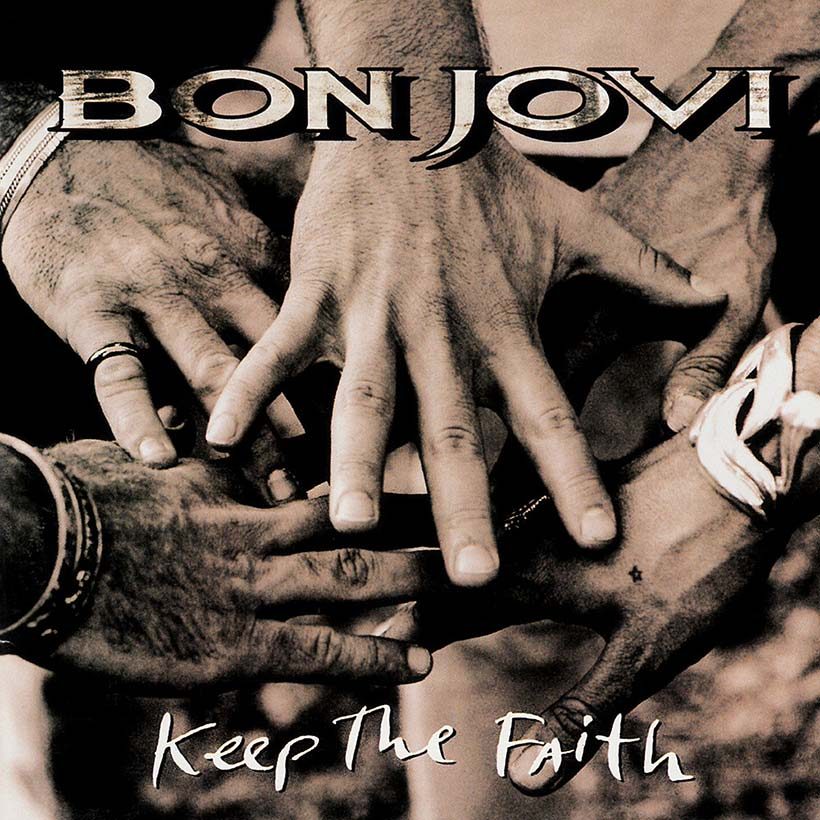‘Keep The Faith’: How Bon Jovi Revitalized Their Sound For A New Decade
Straddling the line between 80s anthems and 90s hard rock, ‘Keep The Faith’ saw Bon Jovi rejuvenated, ready to dominate another decade.

The early 90s were a time of great change in the music world, with grunge and hip-hop starting to dominate the airwaves. Bands that ruled the 80s, like Bon Jovi, who had amassed a string of successful albums by the end of the decade, had to adapt or die. Bon Jovi opted for the former, as they proved on their fifth studio album, Keep The Faith. Not only did they change, however, they did so without losing their hard-rocking sound.
An extended hiatus
In 1989, Bon Jovi released their triumphant New Jersey album, proving they could make good on the promise of Slippery When Wet. In the four years that followed, however, the band’s creative energy had also been directed into solo pursuits. The success of New Jersey and its numerous hit singles gave Jon Bon Jovi the freedom to explore other projects, in particular a solo album in the form of the Young Guns II soundtrack.
That record spawned the hit single in “Blaze Of Glory,” which is still a staple on rock radio. Additionally, lead guitarist Richie Sambora dropped his first solo effort, Stranger In This Town, during the band’s semi-extended hiatus. With the key members’ attentions seemingly elsewhere, no one knew what to expect from the next Bon Jovi album.
Reunited and renewed
By the time Bon Jovi, Sambora, Tico Torres, Alec John Such, and David Bryan went back into the studio together, things had shifted internally. The band axed their then-manager, Doc McGhee, and Jon Bon Jovi himself got more involved in the band’s day-to-day decision-making.
The band continued their tradition of not recording at home, returning to Vancouver’s Little Mountain Sound Studios (where they had recorded their previous two albums) and hunkering down for seven months with producer Bob Rock, who had shepherded another rock act through the grunge era when he oversaw Metallica’s “Black Album” . Armed with the songwriting prowess of frequent collaborator Desmond Child, Bon Jovi attacked their new material ferociously. Most of the 30-plus songs for the sessions were written by Bon Jovi himself, or the combination of Bon Jovi and Sambora, with Child and even Bryan chipping in with some contributions.
A musical revolution
During the band’s Keep The Faith sessions, a musical revolution was exploding just over the border, with bands like Nirvana and Pearl Jam bursting onto the scene and kicking hair metal off the radio almost overnight. Both sonically and visually, the band had to evolve: Bon Jovi cut his hair and the group bade goodbye to their spandex uniforms and pop-metal sound.
Fans should have known something different was on the horizon, especially after hearing the album’s title track and lead single, which featured a snarling vocal from Bon Jovi, Sambora’s blues-riddled solo and a thumping bass line. It was a surprising shift, when you compared to a song like “Bad Medicine,” but the consciousness-raising single ushered in a new era for the band, topping the Billboard Mainstream Rock Tracks chart and landing at No. 29 on the Hot 100.
An introspective turn
It wouldn’t be a Bon Jovi album, however, without a few power ballads, and Keep The Faith saw the band at their most introspective “Bed Of Roses” set the standard for lovelorn rock, with a lengthy wailing solo and a delicate Bon Jovi lyric about “Sitting here wasted and wounded at this piano.” The nearly ten-minute “Dry Country” is another slow burner, but also harkens back to the group’s blue-collar anthems, referencing the decline of the oil industry and its effects on the everyman.
Even as Keep The Faith marked a more exploratory direction for the band, they didn’t abandon their core fanbase, as evidenced by the ambitious ballad “In These Arms.” Triumphant and unapologetically bombastic, the song’s romantic yearning, catchy hooks and towering solos have secured its place in Bon Jovi’s regular live set.
Released on November 3, 1992, Keep The Faith debuted at No. 5 on the Billboard 200 albums chart. While the album didn’t reach the same commercial success as the group’s 80s records, it remains an essential entry in Bon Jovi’s discography. Keep The Faith went deeper and darker than anything the band had done before, and Bon Jovi proved they were perfectly capable of traversing new sonic avenues without abandoning their core appeal. Renewed by their solo adventures, the band kept their faith in each other.












